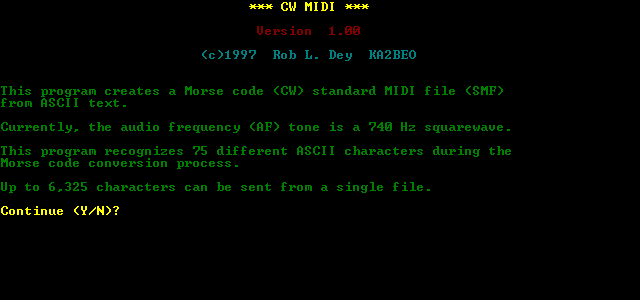A Morse code TEXT-to-MIDI converter that creates a Morse code standard MIDI file from ASCII text.

Description
The World's first TEXT-to-MIDI conversion software! Create Morse code files from ASCII text that play on your sound card.
This program creates a Morse code (CW) Standard MIDI File (SMF) from ASCII text. Create MIDI files that send Morse code,
by simply typing your messages, or importing ASCII text files. MIDI files provide an extremely efficient storage method
for digital audio information. By using MIDI (*.MID) files, instead of using Wave (*.WAV) files to digitally store the
audio, the file size is greatly reduced in comparison for the same Morse code data. You can save your CW MIDI file as a
General MIDI file (*.MID) or as a RIFF MIDI (RMID) file (*.RMI) by including the appropriate file name extension
(.MID or .RMI). This simple program is a "must have" utility for any Amateur Radio operator. Use it to send
"E-Morse" messages, by E-mailing *.MID or *.RMI files to your "Ham" friends, create code-practice files, or create
a CW station ID’er. Although this is a DOS-based program, it also runs great from within Microsoft Windows.
However, a newer and improved version of this software is available specifically for the Windows environment,
called CW Midi for Windows.
Features
· Creates Morse code (CW) Standard MIDI Files (SMF) from ASCII text
· Permits both typing and importing of ASCII text
· Outputs General MIDI file (*.MID) and RIFF MIDI (RMID) file (*.RMI) formats
· Recognizes 75 different ASCII characters during the Morse code conversion process
· Up to 6,325 characters can be sent from a single file
· Saves more than 4 hours of Morse code at 5 WPM, or 1 hour at 18 WPM in a file that is about 250KB in size
· The code speed can be set from 1 to 99 WPM, inclusive
· The audio frequency (AF) tone is fixed at 740 Hz
· The volume level setting is fixed at nominal (adjustable during playback)
· Runs great from within Microsoft Windows also
Operating Systems
The original CW MIDI (for DOS) runs great in DOS, Microsoft Windows 3.1x, and later operating systems.
Requirements
There are practically no minimum computer system resource requirements, other than the soundcard and MIDI file player software that is required for playback.
Installation and Use
Find answers to your questions about installing and using CW MIDI software. This additional information is not available in the context-sensitive online help.
Published Comments
CW Midi for Windows was reviewed in the January 2000 issue of Megahertz (a magazine from France).
It was mentioned also in the August 1998 issue of Morsum Magnificat (a magazine from England).
User Remarks
Read what people have said about CW MIDI (for DOS) and CW Midi for Windows!
Release Dates
CW MIDI (for DOS) v1.00 was released on 12/31/97, and CW Midi for Windows v1.00 and v2.00 was released on 5/16/98.

